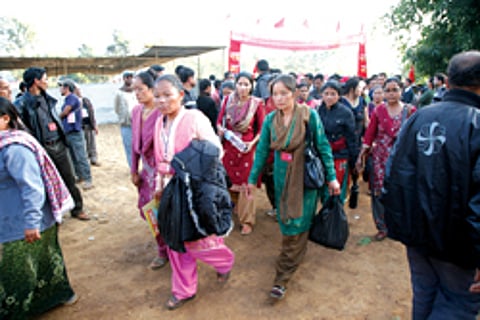Plenum fiasco
In the aftermath of the Unified Communist Party of Nepal (Maoist)'s sixth plenum, held in late November, Pushpa Kamal Dahal, the party's chairman, claimed that the exercise had been a grand success. 'It is absolutely wrong to say that we have come out with the same, confusing political line,' he said, blaming the media for spreading falsehoods. For Dahal, the week-long plenum, held in the village of Palungtar in central Nepal, where over 6000 cadres expressed their opinions, was 'historic, extraordinary and a great exercise of internal democracy'. He said internal disputes were natural in any vibrant communist party, and that the leadership had come out of the experience with new vigour and enthusiasm, having resolved all intra-party policy disputes.
Party insiders say the reality is just the opposite, however, suggesting that the top leadership continues to be divided over the party line, except that now the divisions are public and permeate the party rank and file. The issue at hand is not so much the internal power struggle but the direction of the party and the ongoing peace process. Unable to reconcile their longstanding ideological differences, the three leaders presented separate political documents during the plenum, none of which was endorsed – a first for Dahal, and a situation that thrust the party into ideological confusion. In fact, the ideological divide among the three central leaders – Chairman Dahal, Senior Vice-Chairman Mohan Baidya and Vice-Chairman Baburam Bhattarai – has become so wide that the party now faces an imminent danger of splitting.

